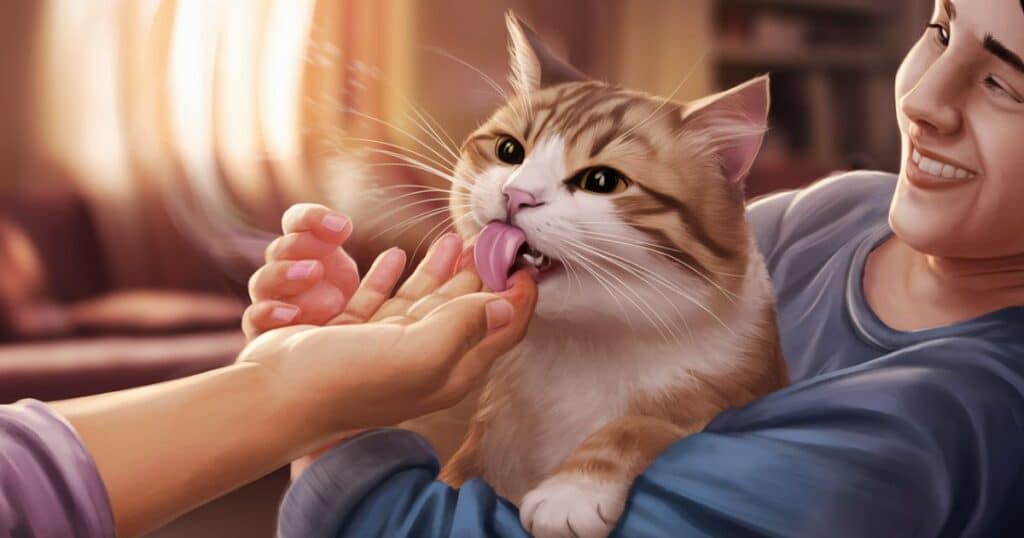Cats are fascinating creatures with complex behaviors that often leave their owners scratching their heads. One perplexing behavior that many cat parents experience is when their feline friend suddenly goes from licking them to biting, seemingly without provocation.
If you’ve ever found yourself wondering, “Why does my cat lick me then bite me?” you’re not alone. This article aims to shed light on this puzzling behavior and provide you with insights to better understand and address it.
Understanding Cat Behavior
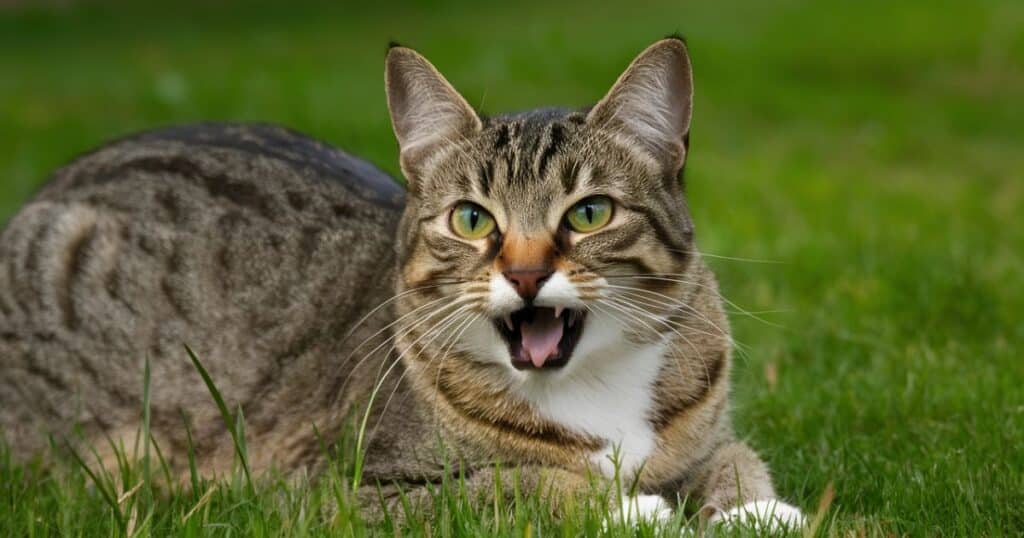
Before we delve into the specific reasons why your cat might lick and bite you, it’s essential to understand that feline behavior is deeply rooted in their natural instincts and evolutionary history. Cats are predatory animals, and many of their behaviors, such as hunting, grooming, and playing, stem from these innate tendencies. Recognizing this context can help us better interpret and respond to their actions.
Reasons Why Your Cat Might Bite You
There are several potential reasons why your cat might lick you and then bite you. It could be a sign of affection, an indication of overstimulation, a desire to play, an attempt at grooming you, a manifestation of stress or frustration, or even a response to pain or discomfort. Let’s explore each of these possibilities in more detail.
MORE POST: Why Is My Cat Gulping While Purring?
Why Does My Cat Hug My Arm and Bite Me?
When your cat hugs your arm and then bites you, it could be a form of playful behavior or an attempt to initiate playtime. Cats often use their paws and mouths to grab and bat at their prey or toys, and your arm may resemble a fun, moving target. However, it’s essential to discourage this behavior, as it can lead to more aggressive biting if left unchecked.
Why Does My Cat Bite Me and Not My Partner?
If you’ve noticed that your cat bites you but not your partner, there could be several reasons behind this selective behavior. It could be due to individual scents, petting styles, or even differences in how you both respond to the biting. Cats are highly sensitive to subtle cues, and they may perceive you and your partner differently, leading to different reactions.
What Should I Do When My Cat Bites Me?
When your cat bites you, it’s crucial to respond appropriately. First and foremost, avoid punishing or yelling at your cat, as this can exacerbate the problem and lead to fear-based aggression. Instead, calmly remove yourself from the situation and disengage from any interaction with your cat. This sends a clear message that biting is unacceptable without resorting to punishment.
Affection: The Love Bite
One potential reason why your cat might lick you and then bite you is as a sign of affection, often referred to as a “love bite.”
“Love Biting”
“Love biting” is a behavior where cats gently nibble or bite their owners as a way of expressing fondness or affection. It may seem counterintuitive, but this behavior is rooted in their natural grooming and social interactions.
It Shows Affection, Even If It Hurts a Little
While a love bite may cause a slight pinch or sting, it’s generally not intended to cause harm. Cats often lick and groom each other as a bonding ritual, and they may extend this behavior to their human companions as a sign of trust and affection. However, it’s essential to discourage this behavior if it becomes too forceful or uncomfortable, as it could escalate into more aggressive biting.
Overstimulation: Your Cat Has Had Enough of Your Pets
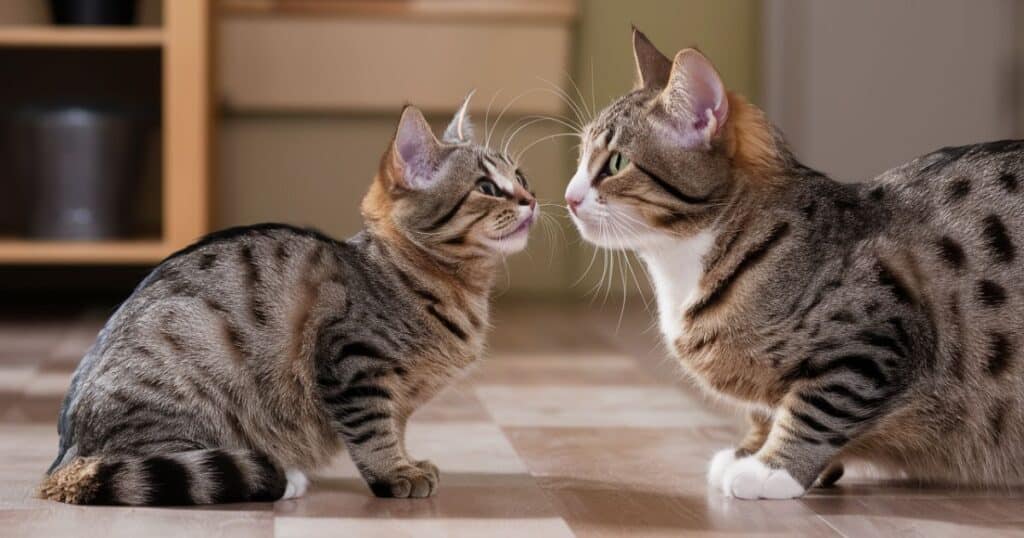
Another common reason for a cat to lick and then bite is overstimulation, also known as “petting-induced aggression.”
What is Cat Overstimulation?
Overstimulation occurs when a cat becomes overwhelmed by prolonged petting or handling, causing them to become agitated and potentially lash out with biting or scratching. This behavior is often a result of the cat’s highly sensitive nerve endings and their instinctive need to protect themselves from perceived threats.
Overstimulation or “Petting-Induced” Aggression Explained
During an extended petting session, your cat may initially enjoy the attention and begin to lick or groom you as a sign of contentment. However, as the petting continues, the stimulation can become too intense, triggering a defensive response. This is when your cat may suddenly switch from licking to biting, seemingly without warning.
Signs Your Cat is Overstimulated
It’s essential to recognize the signs that your cat is becoming overstimulated to prevent potential bites. Some common indicators include:
- Dilated pupils
- Flicking or twitching tail
- Turned-back ears
- Restlessness or fidgeting
- Skin rippling or twitching
How to Avoid Overstimulating Your Cat
To prevent overstimulation and potential bites, it’s crucial to pay attention to your cat’s body language and respect their boundaries. Here are some tips:
- Limit petting sessions: Keep petting sessions short and sweet, and stop as soon as your cat shows signs of discomfort.
- Avoid sensitive areas: Steer clear of petting your cat’s belly, tail, or paws, as these areas are particularly sensitive.
- Offer breaks: If your cat seems to be enjoying the petting session, offer them breaks by briefly stopping and allowing them to initiate further contact.
- Provide alternatives: Provide your cat with appropriate outlets for their energy, such as toys or scratching posts, to prevent them from redirecting their frustration onto you.
By being mindful of your cat’s needs and respecting their boundaries, you can minimize the risk of overstimulation and potential bites.
Playfulness: Your Cat Wants to Play
Sometimes, your cat’s licking and biting behavior may simply be a playful invitation to engage in some interactive fun.
Play Behavior
Play is an essential part of a cat’s natural behavior, and it helps them exercise their hunting instincts and burn off excess energy. During playtime, cats may exhibit a variety of behaviors, including pouncing, chasing, batting, and sometimes even gentle biting or nibbling.
Your Kitty Wants to Play with You
If your cat licks you and then gently bites or nibbles, they may be trying to initiate playtime with you. This behavior is often accompanied by other playful cues, such as crouching, wiggling their hind quarters, or batting at you with their paws.
To encourage appropriate play behavior, it’s essential to provide your cat with plenty of interactive toys and dedicated playtime sessions. This will help satisfy their natural hunting instincts and prevent them from redirecting their playful energy onto your hands or feet.
Grooming: Your Cat May Be Grooming You
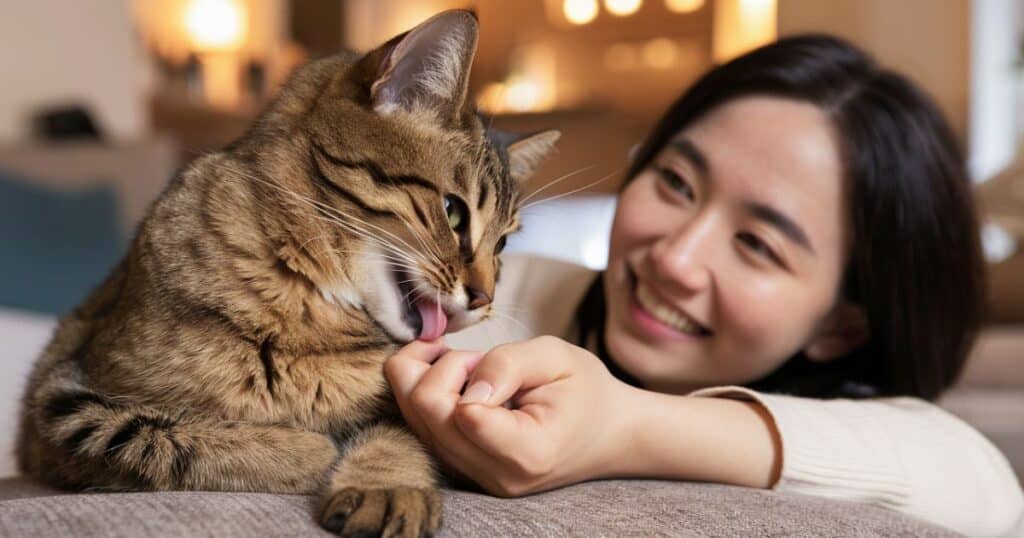
Believe it or not, your cat’s licking and biting behavior could be an attempt to groom you, a behavior known as allogrooming.
Grooming Behavior
Grooming is a crucial part of a cat’s daily routine, helping them maintain a clean and healthy coat, as well as promote bonding and social interactions. Cats spend a significant amount of time grooming themselves and, in some cases, other feline companions or even their human owners.
It’s Grooming You
When your cat licks you and then gently bites or nibbles, they may be trying to groom you in their own unique way. This behavior is often seen as a sign of trust and affection, as your cat is treating you as a member of their social group.
However, it’s important to note that while grooming behavior is generally harmless, it can sometimes lead to excessive licking or biting, especially if your cat is attempting to groom an area that is sensitive or irritated. In these cases, it’s best to gently discourage the behavior and seek veterinary advice if necessary.
Stress: Your Cat May Be Stressed or Anxious
Sometimes, a cat’s licking and biting behavior can be a manifestation of underlying stress, anxiety, or frustration.
Frustrated Cats Sometimes Bite
When cats feel stressed or frustrated, they may engage in behaviors such as excessive grooming
Your Cat is Stressed
Stress and anxiety can manifest in various ways in cats, including excessive grooming, restlessness, loss of appetite, and even aggression. If your cat is licking and then biting you, it could be a sign that they are feeling overwhelmed or threatened by something in their environment.
Potential sources of stress for cats can include changes in their routine, new people or animals in the household, loud noises, or even conflicts with other pets. It’s essential to identify and address the underlying cause of your cat’s stress to help them feel more secure and relaxed.
Consider providing your cat with a safe, quiet space where they can retreat when feeling overwhelmed, and use calming aids such as pheromone diffusers or supplements to help reduce their anxiety levels.
Pain: Your Cat Might Be in Pain
In some cases, your cat’s licking and biting behavior could be a response to physical pain or discomfort.
Pain
Cats are naturally stoic animals and may not always show obvious signs of pain or discomfort. However, excessive grooming or licking in a particular area could indicate an underlying health issue, such as skin infections, flea bites, or other irritations.
If you notice your cat excessively licking or biting at a specific area of their body, it’s essential to have them examined by a veterinarian to rule out any medical concerns. Addressing any underlying health issues can help alleviate your cat’s discomfort and prevent further problematic behaviors.
Communication: Does the Order of Licking or Biting Matter?
When it comes to your cat’s licking and biting behavior, the order in which these actions occur can provide valuable insights into their intentions.
In general, if your cat licks you first and then bites, it is more likely to be a sign of affection, grooming, or overstimulation. However, if your cat bites you first and then licks the area, it could be a warning sign of aggression or an attempt to assert dominance.
It’s essential to pay attention to the context and your cat’s overall body language to accurately interpret their actions and respond appropriately.
Why Do Cats Lick Their Human Owners?
While we’ve explored various reasons why cats might lick and then bite their owners, it’s also worth understanding why cats lick their human companions in the first place.
One reason could be a form of mutual grooming, where your cat is attempting to groom and bond with you, just as they would with other feline companions. Additionally, cats may lick their owners to show affection, seek attention, or even as a way to mark their territory with their scent.
It’s important to note that while a little licking is generally harmless, excessive or obsessive licking could be a sign of an underlying medical or behavioral issue, and it’s best to consult with a veterinarian or animal behaviorist for guidance.
Is Cat Saliva Clean For Humans?
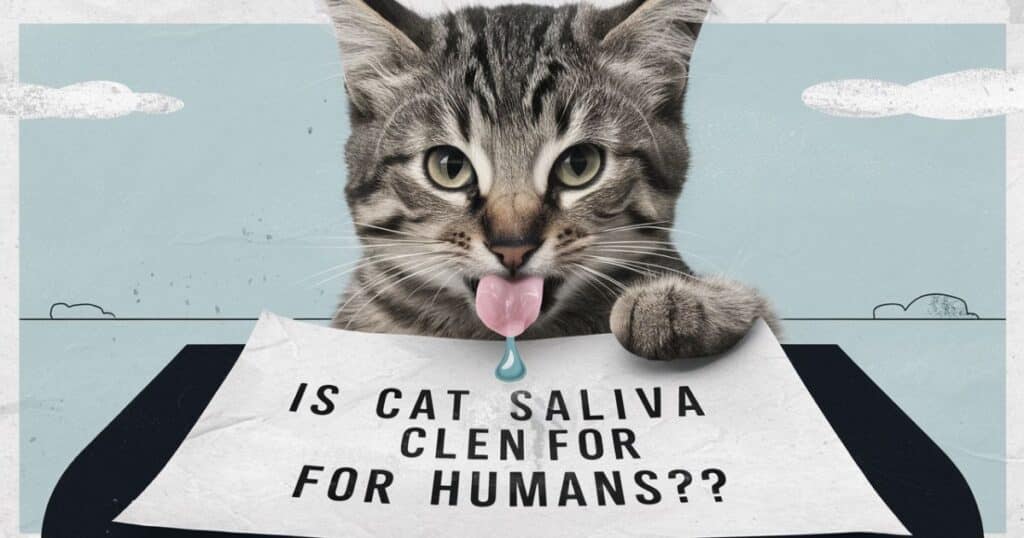
As your cat licks you, you may wonder about the safety and cleanliness of their saliva. While cat saliva is not inherently harmful to humans, it’s important to note that it can contain bacteria and other microorganisms that could potentially cause infections or allergic reactions in some individuals.
It’s generally advisable to avoid letting your cat lick open wounds or sensitive areas, and to practice good hygiene by washing your hands after handling your cat or being licked.
If you have any concerns about your cat’s saliva or potential health risks, it’s best to consult with your veterinarian for personalized advice.
What to Do If the Bite is Aggressive
While some licking and biting behaviors can be attributed to affection, play, or overstimulation, it’s crucial to recognize when a bite is truly aggressive and potentially dangerous.
How to Respond If Your Cat Aggressively Bites You
If your cat bites you forcefully, breaks the skin, or exhibits other signs of aggression, such as hissing, growling, or a rigid body posture, it’s essential to seek medical attention and consult with a veterinarian or animal behaviorist.
Aggressive biting can be a sign of an underlying medical issue, such as pain or neurological problems, or a behavioral issue stemming from fear, anxiety, or lack of proper socialization.
In these cases, it’s crucial to address the root cause of the aggression through proper treatment and behavior modification techniques to ensure the safety of both you and your cat.
How to Stop Your Cat From Biting You
While understanding the reasons behind your cat’s licking and biting behavior is helpful, it’s also essential to learn how to prevent or discourage these actions, especially if they become problematic or excessive.
How Can I Avoid My Cat Biting Me When I Pet Her?
To avoid being bitten by your cat during petting sessions, it’s important to pay close attention to their body language and respect their boundaries.
Look Out for Clues Your Cat is Getting Overstimulated
As mentioned earlier, watch for signs of overstimulation, such as dilated pupils, flicking tail, turned-back ears, and restlessness. When you notice these cues, it’s time to stop petting and give your cat some space.
Change the Way You Pet Your Cat
Experiment with different petting techniques to find what your cat prefers. Some cats enjoy being petted along their cheeks or under their chin, while others may prefer gentle strokes along their back or head. Avoid petting sensitive areas like the belly, tail, or paws.
Use Counter Conditioning to Curb Biting
If your cat has developed a habit of biting during petting sessions, you can try counter conditioning. This involves rewarding your cat with treats or praise when they remain calm and relaxed during petting, gradually increasing the duration of petting over time.
Final Thoughts on Why Cats Lick Then Bite
Cats are fascinating creatures with complex behaviors, and their licking and biting tendencies can sometimes leave us scratching our heads. However, by understanding the potential reasons behind this behavior, such as affection, overstimulation, playfulness, grooming, stress, or pain, we can better respond to and address it.
Remember, every cat is unique, and it’s essential to pay close attention to their individual body language and cues. With patience, understanding, and proper training techniques, you can help minimize problematic biting behaviors and strengthen the bond with your feline companion.
If you ever have concerns about your cat’s behavior or suspect underlying medical issues, don’t hesitate to consult with a veterinarian or animal behaviorist. They can provide personalized guidance and support to ensure the well-being of both you and your furry friend.
Embrace the quirks and complexities of your cat’s behavior, and enjoy the journey of decoding their unique language and building a rewarding relationship with your feline companion.
ALSO READ: Why Does My Dog Wake Up In The Middle Of The Night?
FAQ’s
What does it mean when a cat licks you then bites you?
It could mean affection (a “love bite”), overstimulation from petting, a desire to play, an attempt at grooming you, or a sign of stress or pain. Paying attention to the context and your cat’s body language can help decipher the reason.
Why does my cat cuddle then bite me?
Cuddling followed by biting may indicate overstimulation, where the cat becomes overwhelmed by the prolonged physical contact. It could also be a playful behavior or a way for the cat to initiate playtime with you.
What does it mean when a cat bites you?
A cat bite can have various meanings, including affection (love bites), overstimulation, play, grooming, stress, frustration, or pain. The context, bite intensity, and body language can help determine the underlying reason.
Why does my cat grab my hand and bite me while purring?
If your cat grabs your hand, bites gently, and purrs, it could be a playful behavior inviting you to engage in a game. Alternatively, it may be a sign of affection or an attempt at grooming you through gentle nibbling.

Davin Connor is an experienced author with 3 years in pets writing. Known for concise, informative content, he shares expertise on pet care, behavior, and health through his engaging articles.
